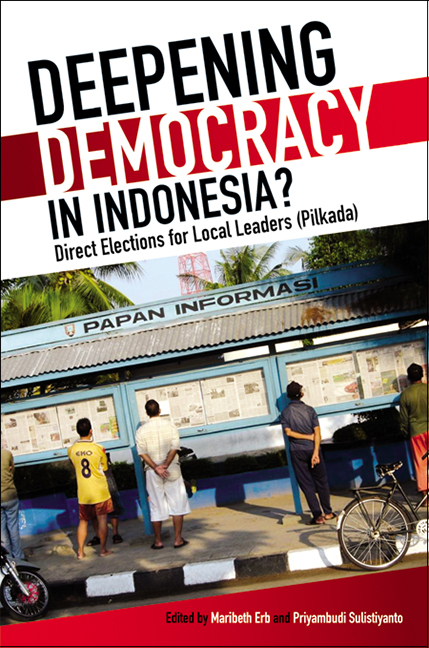Book contents
- Frontmatter
- Dedication
- Contents
- List of Tables
- List of Figures
- Contributors
- Acknowledgements
- Glossary
- 1 Indonesia and the Quest for “Democracy”
- 2 Pilkada Langsung: The First Step on the Long Road to a Dualistic Provincial and District Government
- Part I Political Parties, Politician Elites and the Voters
- 3 Political Parties in Pilkada: Some Problems for Democratic Consolidation
- 4 Batam's 2006 Mayoral Election: Weakened Political Parties and Intensified Power Struggle in Local Indonesia
- 5 The Rising Importance of Personal Networks in Indonesian Local Politics: An Analysis of District Government Head Elections in South Sulawesi in 2005
- 6 Pilkada, Money Politics and the Dangers of “Informal Governance” Practices
- 7 Electing District Heads in Indonesia: Democratic Deepening or Elite Entrenchment?
- 8 Gender and Reform in Indonesian Politics: The Case of a Javanese Woman Bupati
- 9 Pilkada in Bantul District: Incumbent, Populism and the Decline of Royal Power
- Part II Media and Campaigns: Comparing Local and National Elections
- Part III Conflict, Ethnicity, and Political Divisions
- Index
7 - Electing District Heads in Indonesia: Democratic Deepening or Elite Entrenchment?
from Part I - Political Parties, Politician Elites and the Voters
Published online by Cambridge University Press: 21 October 2015
- Frontmatter
- Dedication
- Contents
- List of Tables
- List of Figures
- Contributors
- Acknowledgements
- Glossary
- 1 Indonesia and the Quest for “Democracy”
- 2 Pilkada Langsung: The First Step on the Long Road to a Dualistic Provincial and District Government
- Part I Political Parties, Politician Elites and the Voters
- 3 Political Parties in Pilkada: Some Problems for Democratic Consolidation
- 4 Batam's 2006 Mayoral Election: Weakened Political Parties and Intensified Power Struggle in Local Indonesia
- 5 The Rising Importance of Personal Networks in Indonesian Local Politics: An Analysis of District Government Head Elections in South Sulawesi in 2005
- 6 Pilkada, Money Politics and the Dangers of “Informal Governance” Practices
- 7 Electing District Heads in Indonesia: Democratic Deepening or Elite Entrenchment?
- 8 Gender and Reform in Indonesian Politics: The Case of a Javanese Woman Bupati
- 9 Pilkada in Bantul District: Incumbent, Populism and the Decline of Royal Power
- Part II Media and Campaigns: Comparing Local and National Elections
- Part III Conflict, Ethnicity, and Political Divisions
- Index
Summary
INTRODUCTION: ELECTIONS AND DECENTRALIZATION
What are pilkada — direct regional and local government head elections — meant to achieve? What, for that matter, are any elections supposed to do and to mean to the participants? How do we know if the pilkada have been successful and how should we measure success? Should we be looking more closely at the candidate nomination process, the campaign, the voter turn-out and vote count, the results and their acceptance, or at other more nuanced long-term consequences? What consequences have the direct elections had for the everyday politics of deepening democracy?
This essay will suggest answers to some of those questions in three ways. Firstly, it will present some ideas about what elections in general, and pilkada (direct district head elections) in particular, are supposed to achieve in Indonesia. Secondly, it will briefly examine some observations, competing assessments, and explanations of pilkada processes, outcomes, and their consequences. Thirdly, it will present some local perspectives on the pilkada in Jepara — a district on the north coast of Central Java — that I have been studying for more than twenty-five years.
The pilkada research began in April 2006, and its aim was to capture local elite expectations of the pilkada election process and the expected behaviour — and strategies — of candidates, parties, media, and civil society organizations with local elite explanations of what they think has actually happened. I wanted to investigate how politically active Jeparans saw the election rules, local culture, the political constellation, and the early manoeuvring of would-be candidates (bakal calon) and parties. I asked them to forecast and account for the likely outcomes of the first Jepara pilkada. I also had prolonged conversations with NGO activists, religious leaders, political party heads, journalists, politicians, would-be candidates, bureaucrats, and the outgoing deputy district head (wakil bupati). In interviews and informal discussions they were asked to reflect on what was happening and seemed likely to happen in the Jepara pilkada election. I returned to research the election scheduled for 6 December 2006. For reasons discussed later the election was postponed and eventually took place on 4 February 2007. The results were as predicted: the incumbent won by a wide margin. However, the assumptions, expectations, observations, evaluations, motivations, and conclusions of the Jepara political public about likely voter, candidate, party, and bureaucratic behaviour and their explanations of election outcomes are interesting.
- Type
- Chapter
- Information
- Deepening Democracy in Indonesia?Direct Elections for Local Leaders (Pilkada), pp. 147 - 173Publisher: ISEAS–Yusof Ishak InstitutePrint publication year: 2009

